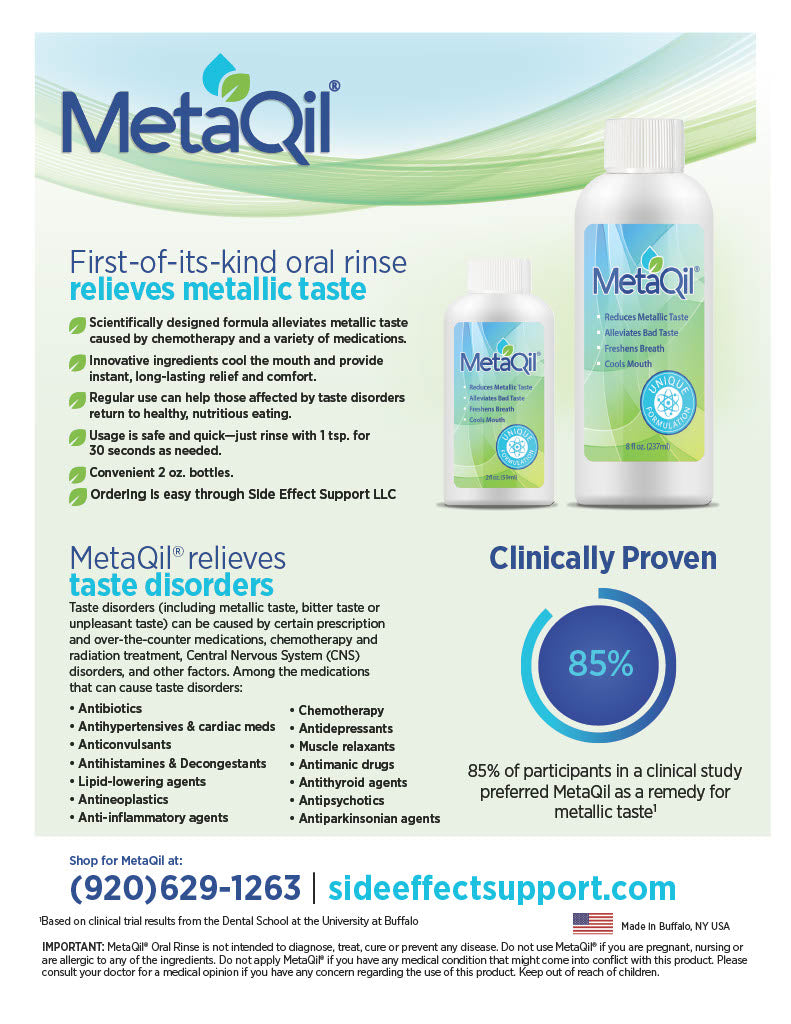Metallic Taste Explained

Metallic taste is a taste disorder medically known as dysgeusia. Most of us have never heard the word dysgeusia before. However, many have experienced an altered taste that can be described as metallic, sour, or bitter in nature.
What causes dysgeusia?
Dysgeusia is an impairment or malfunction of the gustatory organ (sensory organ for taste) that alters food tastes. Many of those suffering from a state of dysgeusia have an unpleasant or altered taste that is usually metallic or bitter.
Tastants And Metallic Taste
Tastants are taste-stimulating proteins that are dissolved in saliva. Tastants stimulate the gustatory organs and send signals producing taste receptor responses (sweet, salty, umami/savory, bitterness, or sourness).
Someone who is suffering from dry mouth may have altered, metallic taste due to salivary dysfunction. If there is not enough saliva within the oral cavity, then there is less production of tastant receptors, and the receptors don’t have enough saliva to stimulate the sense of taste.
Most dysgeusia symptoms that lead to metallic taste originate from the olfactory sensory organ (responsible for smell). The olfactory and gustatory organs are directly correlated via chemo sensation, which are specialized pathways that connect the two organs. The olfactory sense organ can contribute to taste dysfunction and even metallic taste that is associated with chronic sinusitis, allergies, and upper respiratory infections.
Various medical issues associated with Dysgeusia including:
- Chemotherapy especially Head and neck radiation and chemotherapy treatments due to the location of the focused treatment area.
- Radiation
- medications
- COVID-19
- GERD
- Chronic sinusitis
- Other major health conditions associated with central nervous system disorders such as Alzheimer’s, Parkinson’s, and traumatic brain injuries.
An altered sense of taste increases the tendency to add excessive amounts of salts, fats, oils, condiments, or sugars to satiate cravings. This may increase the risk of diabetes, heart disease, obesity, and other chronic metabolic diseases.
Cancer Associated Cachexia
Dysgeusia can lead to poor nutrition and, in extreme cases, cachexia. Cachexia is the weakening and wasting of body tissue due to severe illness. In the case of cancer-associated cachexia specifically, it is a disorder characterized by body weight loss with specific loss of skeletal muscle and adipose tissue. Cachexia is driven by a variable combination of reduced food intake and metabolic changes, including elevated energy expenditure, excess catabolism, and pro-inflammatory responses within the body.
Oral health complications associated with Dysgeusia
People who suffer from dysgeusia may have an increased risk for oral health issues, especially when the symptoms are persistent and chronic.
Unfortunately, the risk for oral health diseases and tooth decay rates may also be affected due to increased consumption of sugars, sweets, and fermentable carbohydrates to compensate for the altered, metallic taste in an attempt to increase food satiation. This all may lead to poor nutrition increasing oral health diseases such as tooth decay, gingivitis, and periodontal disease.
Oral Health Tips for Those Suffering with Dysgeusia
Dysgeusia leaves many people with oral discomfort and an unpleasant metallic taste. Here are some ways to eliminate that taste:
- Dry mouth rinses and sprays; salivary substitute sprays may significantly reduce dysgeusia.
- Utilize an oral rinse prior to eating, this may decrease metallic taste and stabilize pH levels in the oral cavity. MetaQil contains essential oils that are scientifically proven to comfort taste disorders.
- Maintain proper oral hygiene by brushing, flossing, and using a tongue scraper daily. Proper oral hygiene will significantly reduce plaque accumulation, reduce oral inflammation, and decrease the risk for oral health diseases.

*It is important that those suffering from persistent altered or impaired taste receive a definitive diagnosis from their physician in order to find the underlying cause. Chronic dysgeusia may be a sign and symptom of a neurological disease of the central nervous system. Since the gustatory nucleus stems from the central nervous system, altered/metallic taste may be a neurological symptom from a disorder.
*Cancer therapy-related dysgeusia should subside after chemotherapeutic treatment.
Find MetaQil HERE
Get more information about taste changes with Episode #6 of the Teeth Chatters Podcast, "Altered Taste: A By-Product Of Chemotherapy with Dr. Ashley White"





